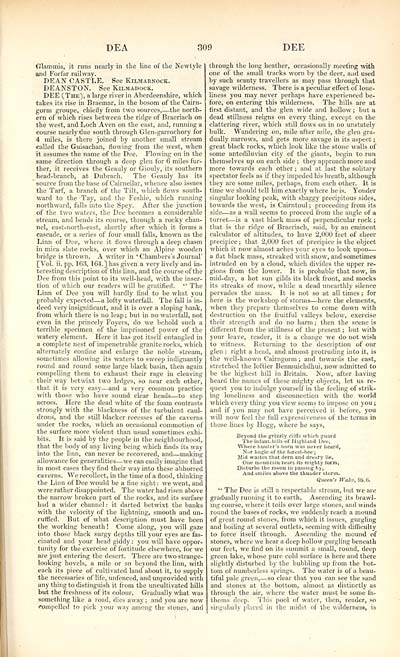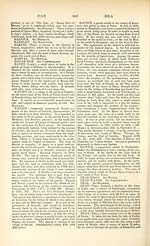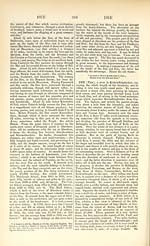Topographical, statistical, and historical gazetteer of Scotland > Volume 1
(391) Page 309
Download files
Complete book:
Individual page:
Thumbnail gallery: Grid view | List view

DEA
309
DEE
Glammis, it runs nearly in the line of the Newtyle
and Forfar railway.
DEAN CASTLE. See Kilmarnock.
DEANSTON. See Kh-madock.
DEE (The), a large river in Aberdeenshire, which
takes its rise in Braemar, in the bosom of the Cairn-
gorm groupe, chiefly from two sources, — the north-
ern of which rises between the ridge of Braeriach on
the west, and Loch Aven on the east, and, running a
course nearly due south through Glen-garrochory for
4 miles, is there joined by another small stream
called the Guisachan, flowing from the west, when
it assumes the name of the Dee. Flowing on in the
same direction through a deep glen for 6 miles fur-
ther, it receives the Geauly or Giouly, its southern
head-branch, at Dubrach. The Geauly has its
source from the base of Cairneilar, whence also issues
the Tarf, a branch of the Tilt, which flows south-
ward to the Tay, and the Feshie, which running
northward, falls into the Spey. After the junction
of the two waters, the Dee becomes a considerable
stream, and bends its course, through a rocky chan-
nel, east-north-east, shortly after which it forms a
cascade, or a series of four small falls, known as the
Linn of Dee, where it flow's through a deep chasm
in mica slate rocks, over which an Alpine wooden
bridge is thrown. A writer in ' Chambers's Journal'
[Vol. ii. pp. 163, 1C4.] has given a very lively and in-
teresting description of this linn, and the course of the
Dee from this point to its well-head, with the inser-
tion of which our readers will be gratified. " The
Linn of Dee you will hardly find to be what you
probably expected — a lofty waterfaU. The fall is in-
deed very insignificant, and it is over a sloping bank,
from which there is no leap ; but in no waterfall, not
even in the princely Foyers, do we behold such a
terrible specimen of the imprisoned power of the
watery element. Here it has got itself entangled in
a complete nest of impenetrable granite rocks, which
alternately confine and enlarge the noble stream,
sometimes allowing its waters to sweep indignantly
round and round some large black basin, then again
compelling them to exhaust their rage in cleaving
their way betwixt two ledges, so near each other,
that it is very easy — and a very common practice
with those who have sound clear heads — to step
across. Here the dead white of the foam contrasts
strongly with the blackness of the turbulent caul-
drons, and the still blacker recesses of the caverns
under the rocks, which an occasional commotion of
the surface more violent than usual sometimes exhi-
bits. It is said by the people in the neighbourhood,
that the body of any living being which finds its way
into the linn, can never be recovered, and — making
allowance for generalities — we can easily imagine that
in most cases they find their way into these abhorred
caverns. We recollect, in the time of a flood, thinking
the Linn of Dee would be a fine sight: we went, and
were rather disappointed. The water had risen above
the narrow broken part of the rocks, and its surface
had a wider channel : it darted betwixt the banks
with the velocity of the lightning, smooth and un-
ruffled. But of what description must have been
the working beneath ! Come along, you will gaze
into those black surgy depths till your eyes are fas-
cinated and your head giddy : you will have oppor-
tunity for the exercise of fortitude elsewhere, for we
are just entering the desert. There are two strange-
looking hovels, a mile or so beyond the linn, with
each its piece of cultivated land about it, to supply
the necessaries of life, unfenced, and unprovided with
any thing to distinguish it from the uncultivated hills
but the freshness of its colour. Gradually what was
something like a road, dies away ; and you are now
compelled to pick your way among the stones, and
through the long heather, occasionally meeting with
one of the small tracks worn by the deer, and used
by such scanty travellers as may pass through that
savage 'wilderness. There is a peculiar effect of lone-
liness you may never perhaps have experienced be-
fore, on entering this wilderness. The hills are at
first distant, and the glen wide and hollow ; but a
dead stillness reigns on every thing, except on the
clattering river, which still flows on in no unstately
bulk. Wandering on, mile after mile, the glen gra-
dually narrows, and gets more savage in its aspect ;
great black rocks, which look like the stone walls of
some antediluvian city of the giants, begin to run
themselves up on each side ; they approach more and
more towards each other ; and at last the solitary
spectator feels as if they impeded his breath, although
they are some miles, perhaps, from each other. It is
time we should tell him exactly where he is. Yonder
singular looking peak, with shaggy precipitous sides,
towards the west, is Cairntoul ; proceeding from its
side — as a wall seems to proceed from the angle of a
turret — is a vast black mass of perpendicular rock ;
that is the ridge of Braeriach, said, by an eminent
calculator of altitudes, to have 2,000 feet of sheer
precipice; that 2,000 feet of precipice is the object
which it now almost aches your eyes to look upon —
a flat black mass, streaked with snow, and sometimes
intruded on by a cloud, which divides the upper re-
gions from the lower. It is probable that now, in
mid-day, a hot sun gilds its black front, and mocks
its streaks of snow, while a dead unearthly silence
pervades the mass. It is not so at all times ; for
here is the workshop of storms — here the elements,
when they prepare themselves to come down with
destruction on the fruitful valleys below, exercise
their strength and do no harm ; then the scene is
different from the stillness of the present ; but with
your leave, reader, it is a change we do not wish
to witness. Returning to the description of our
glen : right a head, and almost protruding into it, is
the well-known Cairngorm ; and towards the east,
stretched the loftier Benmuichdhui, now admitted to
be the highest hill in Britain. Now, after having
heard the names of these mighty objects, let us re-
quest you to indulge yourself' in the feeling of strik-
ing loneliness and disconnection with the world
which every thing you view seems to impose on you ;
and if you may not have perceived it before, you
will now feel the full expressiveness of the terms in
those lines by Hogg, where he says,
Beyond the grizzly cliff's which guard
The infant-hills uf Highland Dee,
Where hunter'8 horn was never heard,
Nor bugle of the forest-bee ;
Mid wastes that dern and dreary lie.
One mountain rears its mighty form,
Disturbs the moon in passing by,
And smiles above the thunder storm.
Queen's Wake, 95, 6.
" The Dee is still a respectable stream, but we are
gradually running it to earth. Ascending its brawl-
ing course, where it toils over large stones, and winds
round the bases of rocks, we suddenly reach a mound
of great round stones, from which it issues, gurgling
and boiling at several outlets, seeming with difficulty
to force itself through. Ascending the mound of
stones, where we hear a deep hollow gurgbng beneath
our feet, we find on its summit a small, round, deep
green lake, whose pure cold surface is here and there
sbghtly disturbed by the bubbling up from the bot-
tom of numberless springs. The water is of a beau-
tiful pale green, — so clear that you can see the sand
and stones at the bottom, almost as distinctly as
through the air, where the water must be some fa-
thoms deep. This pool of water, then, reader, so
singularly placed in the midst of the wilderness, is
309
DEE
Glammis, it runs nearly in the line of the Newtyle
and Forfar railway.
DEAN CASTLE. See Kilmarnock.
DEANSTON. See Kh-madock.
DEE (The), a large river in Aberdeenshire, which
takes its rise in Braemar, in the bosom of the Cairn-
gorm groupe, chiefly from two sources, — the north-
ern of which rises between the ridge of Braeriach on
the west, and Loch Aven on the east, and, running a
course nearly due south through Glen-garrochory for
4 miles, is there joined by another small stream
called the Guisachan, flowing from the west, when
it assumes the name of the Dee. Flowing on in the
same direction through a deep glen for 6 miles fur-
ther, it receives the Geauly or Giouly, its southern
head-branch, at Dubrach. The Geauly has its
source from the base of Cairneilar, whence also issues
the Tarf, a branch of the Tilt, which flows south-
ward to the Tay, and the Feshie, which running
northward, falls into the Spey. After the junction
of the two waters, the Dee becomes a considerable
stream, and bends its course, through a rocky chan-
nel, east-north-east, shortly after which it forms a
cascade, or a series of four small falls, known as the
Linn of Dee, where it flow's through a deep chasm
in mica slate rocks, over which an Alpine wooden
bridge is thrown. A writer in ' Chambers's Journal'
[Vol. ii. pp. 163, 1C4.] has given a very lively and in-
teresting description of this linn, and the course of the
Dee from this point to its well-head, with the inser-
tion of which our readers will be gratified. " The
Linn of Dee you will hardly find to be what you
probably expected — a lofty waterfaU. The fall is in-
deed very insignificant, and it is over a sloping bank,
from which there is no leap ; but in no waterfall, not
even in the princely Foyers, do we behold such a
terrible specimen of the imprisoned power of the
watery element. Here it has got itself entangled in
a complete nest of impenetrable granite rocks, which
alternately confine and enlarge the noble stream,
sometimes allowing its waters to sweep indignantly
round and round some large black basin, then again
compelling them to exhaust their rage in cleaving
their way betwixt two ledges, so near each other,
that it is very easy — and a very common practice
with those who have sound clear heads — to step
across. Here the dead white of the foam contrasts
strongly with the blackness of the turbulent caul-
drons, and the still blacker recesses of the caverns
under the rocks, which an occasional commotion of
the surface more violent than usual sometimes exhi-
bits. It is said by the people in the neighbourhood,
that the body of any living being which finds its way
into the linn, can never be recovered, and — making
allowance for generalities — we can easily imagine that
in most cases they find their way into these abhorred
caverns. We recollect, in the time of a flood, thinking
the Linn of Dee would be a fine sight: we went, and
were rather disappointed. The water had risen above
the narrow broken part of the rocks, and its surface
had a wider channel : it darted betwixt the banks
with the velocity of the lightning, smooth and un-
ruffled. But of what description must have been
the working beneath ! Come along, you will gaze
into those black surgy depths till your eyes are fas-
cinated and your head giddy : you will have oppor-
tunity for the exercise of fortitude elsewhere, for we
are just entering the desert. There are two strange-
looking hovels, a mile or so beyond the linn, with
each its piece of cultivated land about it, to supply
the necessaries of life, unfenced, and unprovided with
any thing to distinguish it from the uncultivated hills
but the freshness of its colour. Gradually what was
something like a road, dies away ; and you are now
compelled to pick your way among the stones, and
through the long heather, occasionally meeting with
one of the small tracks worn by the deer, and used
by such scanty travellers as may pass through that
savage 'wilderness. There is a peculiar effect of lone-
liness you may never perhaps have experienced be-
fore, on entering this wilderness. The hills are at
first distant, and the glen wide and hollow ; but a
dead stillness reigns on every thing, except on the
clattering river, which still flows on in no unstately
bulk. Wandering on, mile after mile, the glen gra-
dually narrows, and gets more savage in its aspect ;
great black rocks, which look like the stone walls of
some antediluvian city of the giants, begin to run
themselves up on each side ; they approach more and
more towards each other ; and at last the solitary
spectator feels as if they impeded his breath, although
they are some miles, perhaps, from each other. It is
time we should tell him exactly where he is. Yonder
singular looking peak, with shaggy precipitous sides,
towards the west, is Cairntoul ; proceeding from its
side — as a wall seems to proceed from the angle of a
turret — is a vast black mass of perpendicular rock ;
that is the ridge of Braeriach, said, by an eminent
calculator of altitudes, to have 2,000 feet of sheer
precipice; that 2,000 feet of precipice is the object
which it now almost aches your eyes to look upon —
a flat black mass, streaked with snow, and sometimes
intruded on by a cloud, which divides the upper re-
gions from the lower. It is probable that now, in
mid-day, a hot sun gilds its black front, and mocks
its streaks of snow, while a dead unearthly silence
pervades the mass. It is not so at all times ; for
here is the workshop of storms — here the elements,
when they prepare themselves to come down with
destruction on the fruitful valleys below, exercise
their strength and do no harm ; then the scene is
different from the stillness of the present ; but with
your leave, reader, it is a change we do not wish
to witness. Returning to the description of our
glen : right a head, and almost protruding into it, is
the well-known Cairngorm ; and towards the east,
stretched the loftier Benmuichdhui, now admitted to
be the highest hill in Britain. Now, after having
heard the names of these mighty objects, let us re-
quest you to indulge yourself' in the feeling of strik-
ing loneliness and disconnection with the world
which every thing you view seems to impose on you ;
and if you may not have perceived it before, you
will now feel the full expressiveness of the terms in
those lines by Hogg, where he says,
Beyond the grizzly cliff's which guard
The infant-hills uf Highland Dee,
Where hunter'8 horn was never heard,
Nor bugle of the forest-bee ;
Mid wastes that dern and dreary lie.
One mountain rears its mighty form,
Disturbs the moon in passing by,
And smiles above the thunder storm.
Queen's Wake, 95, 6.
" The Dee is still a respectable stream, but we are
gradually running it to earth. Ascending its brawl-
ing course, where it toils over large stones, and winds
round the bases of rocks, we suddenly reach a mound
of great round stones, from which it issues, gurgling
and boiling at several outlets, seeming with difficulty
to force itself through. Ascending the mound of
stones, where we hear a deep hollow gurgbng beneath
our feet, we find on its summit a small, round, deep
green lake, whose pure cold surface is here and there
sbghtly disturbed by the bubbling up from the bot-
tom of numberless springs. The water is of a beau-
tiful pale green, — so clear that you can see the sand
and stones at the bottom, almost as distinctly as
through the air, where the water must be some fa-
thoms deep. This pool of water, then, reader, so
singularly placed in the midst of the wilderness, is
Set display mode to: Large image | Transcription
Images and transcriptions on this page, including medium image downloads, may be used under the Creative Commons Attribution 4.0 International Licence unless otherwise stated. ![]()
| Gazetteers of Scotland, 1803-1901 > Topographical, statistical, and historical gazetteer of Scotland > Volume 1 > (391) Page 309 |
|---|
| Permanent URL | https://digital.nls.uk/97442238 |
|---|
| Description | Volume first. A-H. |
|---|---|
| Attribution and copyright: |
|

